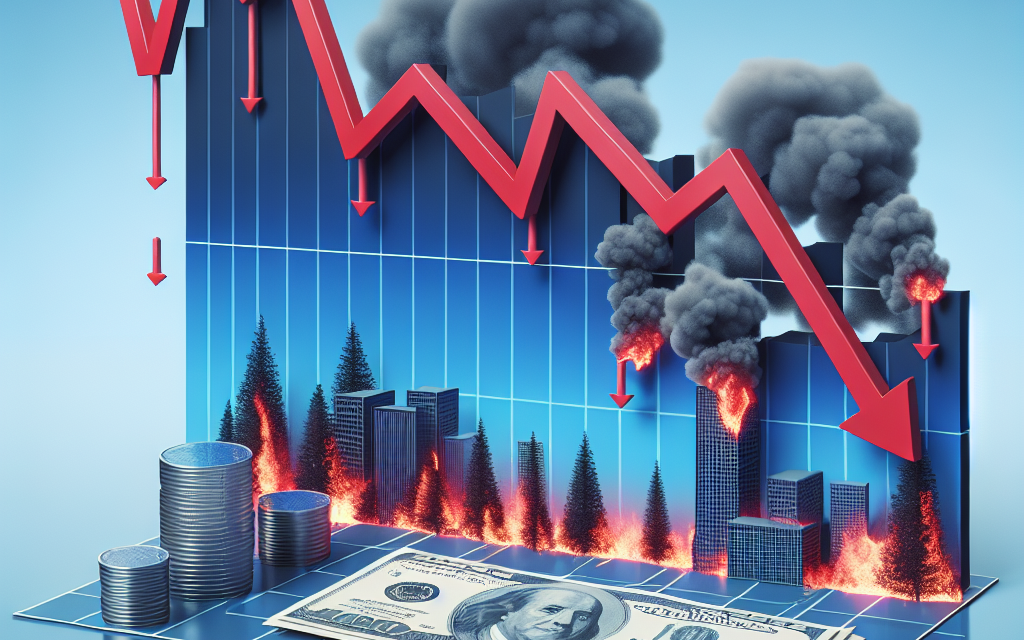“Edison International’s Shares and Bonds Plummet Amid LA Wildfire Crisis.”
Introduction
Edison International, the parent company of Southern California Edison, has experienced a notable decline in its shares and bonds following the outbreak of wildfires in Los Angeles. The wildfires have raised concerns over potential liabilities and the company’s ability to manage wildfire risks, which have historically impacted utility companies in California. Investors are reacting to the heightened uncertainty surrounding regulatory scrutiny, potential legal claims, and the financial implications of wildfire-related damages, leading to a decrease in market confidence and a subsequent drop in the company’s stock and bond prices.
Edison’s Stock Performance Amid LA Wildfire Crisis
Edison International, a prominent utility company serving millions of customers in Southern California, has recently faced significant challenges as wildfires ravaged the Los Angeles area. The devastating impact of these wildfires has not only affected the local communities but has also led to a notable decline in the company’s stock performance and bond ratings. As the crisis unfolded, investors reacted swiftly to the potential financial implications of the wildfires, resulting in a marked decrease in Edison’s share prices.
The wildfires, exacerbated by dry conditions and strong winds, raised concerns about the safety and reliability of Edison’s infrastructure. Given the company’s historical association with previous wildfire incidents, including the catastrophic fires in 2018 and 2019, investors were particularly sensitive to the potential liabilities that could arise from this latest crisis. The fear of increased regulatory scrutiny and the possibility of costly legal claims loomed large, prompting many to reassess their positions in the company. Consequently, Edison’s stock experienced a sharp decline, reflecting the market’s apprehension regarding the company’s ability to manage the fallout from the wildfires.
In addition to the drop in stock prices, Edison International’s bonds also faced downward pressure. Credit rating agencies closely monitored the situation, evaluating the potential impact of the wildfires on the company’s financial stability. As the fires continued to spread, concerns about Edison’s capacity to meet its debt obligations grew, leading to a reassessment of its creditworthiness. This resulted in a downgrade of its bond ratings, further compounding the challenges faced by the company. Investors, wary of the increased risk associated with holding Edison’s bonds, began to demand higher yields, which in turn contributed to the decline in bond prices.
Moreover, the broader market sentiment regarding utility companies in wildfire-prone regions has shifted significantly. Investors are increasingly cautious about the long-term viability of companies like Edison, which operate in areas susceptible to natural disasters. This shift in sentiment has led to a reevaluation of the risk profiles associated with utility stocks, particularly those with a history of wildfire-related incidents. As a result, Edison International has found itself at the center of a growing debate about the sustainability of its business model in the face of climate change and increasing environmental risks.
Despite these challenges, Edison International has taken proactive measures to address the situation. The company has committed to investing in infrastructure improvements and enhanced safety protocols to mitigate the risk of future wildfires. These initiatives are aimed at restoring investor confidence and demonstrating a commitment to responsible management practices. However, the effectiveness of these measures remains to be seen, as the company navigates the complex landscape of regulatory requirements and public scrutiny.
In conclusion, the recent wildfires in Los Angeles have had a profound impact on Edison International’s stock performance and bond ratings. The decline in share prices and the downgrade of bonds reflect the market’s concerns about the company’s ability to manage the financial repercussions of the crisis. As Edison works to implement safety measures and improve its infrastructure, the road ahead will require careful navigation of both investor expectations and regulatory challenges. The outcome of this situation will not only shape the future of Edison International but will also serve as a critical case study for utility companies operating in high-risk environments.
Impact of Wildfires on Utility Bonds: A Case Study of Edison International
The recent wildfires in Los Angeles have had a significant impact on the financial landscape of utility companies, particularly Edison International. As one of the largest electric utility providers in Southern California, the company has found itself at the center of scrutiny following the devastating effects of these wildfires. The immediate aftermath of such natural disasters often leads to a decline in both shares and bonds, as investors reassess the risks associated with utility companies that operate in fire-prone areas. This case study of Edison International illustrates the broader implications of wildfires on utility bonds and the financial markets.
In the wake of the wildfires, Edison International’s stock experienced a notable decline, reflecting investor concerns about potential liabilities and regulatory scrutiny. The company has faced criticism in the past regarding its infrastructure and the role it may play in exacerbating wildfire risks. As a result, the market reacted swiftly, leading to a sell-off of shares as investors sought to mitigate their exposure to perceived risks. This decline in share price is not merely a reflection of immediate financial losses but also an indication of the long-term implications that such disasters can have on a utility’s operational viability and reputation.
Moreover, the bond market has also felt the repercussions of the wildfires. Utility bonds, which are often considered a stable investment, can become increasingly volatile in the face of natural disasters. Investors typically view these bonds as a safe haven; however, when a utility company faces the prospect of significant liabilities due to wildfire-related damages, the perceived risk associated with these bonds increases. Consequently, the yield on Edison International’s bonds has risen, indicating a decline in their market value. This shift in investor sentiment underscores the interconnectedness of environmental risks and financial performance in the utility sector.
The implications of these developments extend beyond Edison International itself. The decline in shares and bonds serves as a cautionary tale for other utility companies operating in similar environments. Investors are becoming increasingly aware of the potential for climate-related risks to impact financial stability. As wildfires become more frequent and severe due to climate change, utility companies may find it increasingly challenging to maintain investor confidence. This situation could lead to a reevaluation of investment strategies, with a growing emphasis on environmental, social, and governance (ESG) factors.
Furthermore, regulatory responses to wildfires can also influence the financial health of utility companies. In California, for instance, lawmakers have implemented measures aimed at holding utilities accountable for wildfire damages. These regulations can lead to increased costs for companies like Edison International, further straining their financial resources. As a result, the market may continue to react negatively to news related to regulatory changes, compounding the challenges faced by utility companies in the aftermath of wildfires.
In conclusion, the decline in Edison International’s shares and bonds following the Los Angeles wildfires highlights the profound impact that such natural disasters can have on utility companies. The interplay between environmental risks and financial performance is becoming increasingly evident, prompting investors to reconsider their strategies in light of potential liabilities. As the frequency of wildfires continues to rise, the utility sector must adapt to these challenges, ensuring that they not only address immediate financial concerns but also develop long-term strategies to mitigate risks associated with climate change.
Investor Reactions to Edison’s Declining Shares Post-Wildfire
In the wake of the recent wildfires in Los Angeles, investor sentiment surrounding Edison International has taken a notable downturn, leading to a decline in both its shares and bonds. The wildfires, which have wreaked havoc across the region, have raised significant concerns regarding the utility company’s operational stability and financial health. As a result, investors are reassessing their positions, leading to a marked decrease in the company’s stock price and bond yields.
The immediate reaction from the market was one of caution, as investors grappled with the potential financial implications of the wildfires. Edison International, as a major utility provider, is often scrutinized for its role in wildfire management and prevention. The company’s historical challenges with wildfires, particularly those linked to its equipment, have left a lasting impression on investor confidence. Consequently, the recent outbreak of fires has reignited fears of liability and regulatory scrutiny, prompting many investors to reconsider their exposure to the company.
Moreover, the broader implications of the wildfires extend beyond immediate financial losses. Investors are increasingly aware of the long-term risks associated with climate change and its impact on utility companies. As wildfires become more frequent and severe, the potential for increased operational costs, regulatory changes, and reputational damage looms large. This evolving landscape has led to a more cautious approach among investors, who are now weighing the risks against potential returns more critically than ever before.
In addition to these concerns, analysts have begun to adjust their forecasts for Edison International, reflecting a more pessimistic outlook. Downgrades from various financial institutions have further exacerbated the decline in share prices, as investors react to the revised projections. The combination of negative sentiment and lowered expectations has created a challenging environment for the company, as it seeks to navigate the aftermath of the wildfires while maintaining investor trust.
Furthermore, the bond market has also felt the impact of the wildfires, with yields on Edison International’s bonds rising as investors demand higher compensation for perceived risk. This shift indicates a growing apprehension about the company’s ability to manage its liabilities effectively in the face of natural disasters. As investors seek safer havens, the demand for Edison’s bonds has diminished, leading to a decline in their market value.
As the situation unfolds, it is essential for Edison International to communicate effectively with its stakeholders. Transparency regarding the company’s response to the wildfires, as well as its strategies for mitigating future risks, will be crucial in restoring investor confidence. Engaging with the community and demonstrating a commitment to safety and sustainability can also play a pivotal role in rebuilding trust.
In conclusion, the decline in Edison International’s shares and bonds following the Los Angeles wildfires reflects a complex interplay of investor sentiment, regulatory concerns, and broader market dynamics. As investors reassess their positions in light of these developments, the company faces the challenge of not only addressing immediate financial concerns but also navigating the long-term implications of climate change and operational risk. The path forward will require strategic communication and a commitment to proactive risk management to reassure investors and stabilize the company’s financial standing in an increasingly volatile environment.
Analyzing the Financial Implications of LA Wildfires on Edison International
The recent wildfires in Los Angeles have had a significant impact on various sectors, with Edison International, a major utility provider, experiencing notable declines in both its shares and bonds. As the wildfires raged, concerns about the company’s financial stability and operational capacity intensified, leading to a ripple effect in the financial markets. Investors, already wary of the potential liabilities associated with wildfire-related damages, reacted swiftly, resulting in a marked decrease in Edison International’s stock prices.
The decline in share value can be attributed to several factors, primarily the heightened risk of litigation and regulatory scrutiny that often follows such catastrophic events. Utility companies, particularly those operating in fire-prone areas, face increasing pressure to demonstrate their commitment to safety and risk management. In the case of Edison International, the company has previously been implicated in wildfires, which raises concerns about its ability to manage its infrastructure effectively. As a result, investors are apprehensive about the potential for significant financial liabilities stemming from lawsuits and regulatory fines, which could further erode the company’s profitability.
Moreover, the wildfires have disrupted Edison International’s operations, leading to power outages and service interruptions for thousands of customers. This disruption not only affects the company’s immediate revenue streams but also damages its reputation and customer trust. In an era where consumers are increasingly concerned about sustainability and corporate responsibility, any perceived failure to manage wildfire risks can have long-lasting repercussions on customer loyalty and brand image. Consequently, the decline in shares reflects a broader concern about the company’s ability to navigate these challenges while maintaining its market position.
In addition to the immediate impacts on share prices, the bond market has also reacted negatively to the wildfire situation. Investors in corporate bonds are particularly sensitive to credit risk, and the potential for increased liabilities associated with the wildfires raises questions about Edison International’s creditworthiness. As the company faces the prospect of higher insurance premiums and potential downgrades from credit rating agencies, bondholders may demand higher yields to compensate for the perceived risk. This shift can lead to an increase in borrowing costs for the company, further straining its financial resources.
Furthermore, the wildfires have prompted discussions about the long-term sustainability of utility operations in fire-prone regions. As climate change continues to exacerbate the frequency and intensity of wildfires, utility companies like Edison International may need to invest significantly in infrastructure improvements and fire mitigation strategies. While these investments are essential for long-term viability, they also require substantial capital, which could divert funds from other critical areas of the business. This potential reallocation of resources may lead to slower growth and reduced returns for investors in the short term.
In conclusion, the financial implications of the recent LA wildfires on Edison International are multifaceted and significant. The decline in shares and bonds reflects investor concerns about the company’s operational risks, potential liabilities, and long-term sustainability in an increasingly volatile environment. As Edison International navigates these challenges, it will be crucial for the company to implement effective risk management strategies and communicate transparently with stakeholders to restore confidence and stabilize its financial standing. The path forward will require a delicate balance between addressing immediate concerns and investing in the future resilience of its operations.
Strategies for Investors: Navigating Edison’s Share Decline
Edison International, a prominent utility company serving millions in Southern California, has recently faced significant challenges due to the devastating wildfires in Los Angeles. As the flames engulfed vast areas, concerns about the company’s liability and the potential financial repercussions have led to a notable decline in both its shares and bonds. For investors, this situation presents a complex landscape that requires careful navigation. Understanding the underlying factors contributing to this decline is essential for making informed decisions.
Firstly, it is crucial to recognize the historical context of utility companies in wildfire-prone regions. In recent years, several utilities have faced substantial liabilities stemming from wildfires, leading to bankruptcy filings and significant stock price drops. Investors should consider the implications of these precedents when evaluating Edison International’s current predicament. The company’s exposure to wildfire risks is not merely a short-term concern; it reflects a broader trend affecting the entire sector. As climate change intensifies, the frequency and severity of wildfires are expected to increase, raising questions about the long-term viability of utility stocks in these regions.
In light of these challenges, investors may want to adopt a diversified investment strategy. By spreading investments across various sectors, including those less susceptible to environmental risks, investors can mitigate potential losses associated with Edison International’s decline. Diversification not only helps in managing risk but also positions investors to capitalize on opportunities in other industries that may be thriving despite the turmoil in the utility sector.
Moreover, it is essential for investors to stay informed about regulatory developments and the company’s response to the wildfire crisis. Edison International’s management has a critical role in addressing the current situation, and their strategies will significantly influence the company’s recovery trajectory. Investors should closely monitor any announcements regarding risk management initiatives, infrastructure investments, and potential settlements related to wildfire liabilities. A proactive approach from the company could signal resilience and a commitment to safeguarding shareholder interests, which may, in turn, stabilize or even enhance stock performance over time.
Additionally, investors should consider the potential for long-term recovery. While the immediate impact of the wildfires has been detrimental, the utility sector often exhibits cyclical characteristics. Historical data suggests that companies can rebound from crises, particularly when they implement effective risk management strategies and adapt to changing environmental conditions. Therefore, investors with a long-term perspective may find value in purchasing shares at a lower price during this downturn, anticipating a future recovery as the company navigates its challenges.
Furthermore, it is prudent for investors to evaluate their risk tolerance and investment horizon. Those with a higher risk appetite may view the current decline as an opportunity to enter the market at a discounted rate, while more conservative investors might prefer to wait for clearer signs of recovery before committing additional capital. Ultimately, the decision to invest in Edison International during this tumultuous period should be guided by a thorough analysis of both the company’s fundamentals and the broader market environment.
In conclusion, navigating the decline of Edison International’s shares and bonds due to the LA wildfires requires a multifaceted approach. By diversifying investments, staying informed about regulatory changes, considering long-term recovery potential, and assessing individual risk tolerance, investors can make strategic decisions that align with their financial goals. As the situation evolves, maintaining a vigilant and informed stance will be crucial for successfully managing investments in this challenging landscape.
The Role of Regulatory Changes in Edison’s Bond Market Response
Edison International, a prominent utility company serving millions in Southern California, has recently faced significant challenges in the wake of the Los Angeles wildfire. The devastating impact of the fire not only affected the local communities but also reverberated through the financial markets, leading to a notable decline in both the company’s shares and bonds. This downturn can be attributed, in part, to the evolving landscape of regulatory changes that govern utility operations and their financial implications.
As wildfires become increasingly frequent and severe, regulatory bodies have responded by implementing stricter safety and operational standards for utility companies. These changes are designed to mitigate risks associated with power lines and other infrastructure that can ignite fires. For Edison International, the heightened scrutiny has led to increased operational costs and a more complex regulatory environment. Consequently, investors have become wary of the potential financial liabilities that could arise from non-compliance or from the consequences of future wildfires.
Moreover, the regulatory framework surrounding utility companies has shifted towards a more proactive stance, emphasizing the need for robust risk management strategies. This shift has prompted Edison to reassess its operational protocols and invest in advanced technologies aimed at fire prevention and response. While these investments are essential for long-term sustainability, they also require substantial capital, which can strain the company’s financial resources in the short term. As a result, the market has reacted negatively, leading to a decline in bond prices as investors factor in the increased risk associated with regulatory compliance and potential liabilities.
In addition to operational changes, the regulatory environment has also influenced the way utilities manage their financial structures. For instance, the introduction of new regulations may necessitate adjustments in capital allocation, which can impact the overall creditworthiness of a company. Investors closely monitor these developments, as any perceived increase in risk can lead to a reassessment of bond ratings. In Edison’s case, the combination of wildfire-related liabilities and regulatory pressures has raised concerns about its ability to maintain favorable credit ratings, further contributing to the decline in bond prices.
Furthermore, the regulatory landscape is not static; it continues to evolve in response to environmental challenges and public sentiment. As communities demand greater accountability from utility companies, regulators are likely to impose even stricter requirements. This ongoing evolution creates an atmosphere of uncertainty, which can deter investment in utility bonds. Investors may seek to mitigate their exposure to companies like Edison that are grappling with the dual pressures of regulatory compliance and environmental risk.
In conclusion, the decline in Edison International’s shares and bonds following the Los Angeles wildfire can be largely attributed to the role of regulatory changes in shaping the company’s operational and financial landscape. As the utility sector adapts to new regulations aimed at enhancing safety and risk management, companies like Edison must navigate the complexities of compliance while managing investor expectations. The interplay between regulatory developments and market perceptions will continue to influence Edison’s financial performance, making it imperative for the company to remain agile in its response to both regulatory demands and environmental challenges. As the situation unfolds, stakeholders will be closely watching how Edison International addresses these multifaceted issues in order to restore confidence in its financial stability.
Future Outlook: Recovery Prospects for Edison International After Wildfires
The recent wildfires in Los Angeles have had a significant impact on Edison International, leading to a decline in both its shares and bonds. As the company grapples with the immediate aftermath of these devastating events, stakeholders are keenly interested in understanding the future outlook for recovery. The wildfires not only pose a threat to the physical infrastructure of the utility but also raise concerns about regulatory scrutiny and financial liabilities that could affect its long-term viability.
In the wake of the wildfires, Edison International faces the dual challenge of restoring services to affected areas while managing the financial repercussions of the disaster. The company has historically been involved in wildfire mitigation efforts, investing in technology and infrastructure improvements to reduce the risk of future incidents. However, the scale of the recent fires may necessitate an even more aggressive approach to risk management. This could involve further investments in fire-resistant infrastructure, enhanced vegetation management, and advanced monitoring systems to detect potential hazards before they escalate.
Moreover, the regulatory environment surrounding utility companies in California has become increasingly stringent, particularly in the context of wildfire-related liabilities. Edison International must navigate these regulations carefully, as failure to comply could result in substantial fines and increased scrutiny from state authorities. The company’s ability to demonstrate a commitment to safety and proactive risk management will be crucial in rebuilding trust with regulators and the public alike. This trust is essential not only for operational stability but also for maintaining investor confidence, which has been shaken by the recent decline in share and bond prices.
In addition to regulatory challenges, Edison International must also consider the broader economic implications of the wildfires. The destruction of property and infrastructure can lead to a decrease in demand for electricity in the short term, as communities focus on recovery rather than consumption. However, as rebuilding efforts commence, there may be an uptick in demand for energy, particularly if new construction incorporates more energy-efficient technologies. This potential for increased demand could provide a silver lining for Edison International, allowing the company to capitalize on the recovery phase.
Furthermore, the company’s commitment to sustainability and renewable energy initiatives may play a pivotal role in its recovery strategy. As California continues to push for a transition to cleaner energy sources, Edison International has the opportunity to align its recovery efforts with state goals. By investing in renewable energy projects and enhancing its grid resilience, the company can position itself as a leader in the energy sector while also addressing the concerns of investors and regulators.
In conclusion, while the immediate aftermath of the Los Angeles wildfires presents significant challenges for Edison International, there are also opportunities for recovery and growth. The company’s proactive approach to risk management, compliance with regulatory requirements, and commitment to sustainability will be critical in navigating this tumultuous period. As Edison International works to restore services and rebuild its reputation, stakeholders will be closely monitoring its strategies and performance. Ultimately, the path to recovery will depend on the company’s ability to adapt to the evolving landscape of the energy sector while addressing the pressing concerns that have arisen from the recent wildfires.
Q&A
1. **Question:** What caused the decline in Edison International’s shares and bonds?
**Answer:** The decline was primarily due to the impact of the LA wildfire, which raised concerns about potential liabilities and damages.
2. **Question:** How much did Edison International’s shares drop following the wildfire news?
**Answer:** Edison International’s shares dropped by approximately 5% in the immediate aftermath of the wildfire reports.
3. **Question:** What specific concerns did investors have regarding Edison International’s financial stability?
**Answer:** Investors were concerned about the potential for significant legal liabilities and costs associated with wildfire damages, which could affect the company’s financial health.
4. **Question:** Did Edison International’s bonds also experience a decline?
**Answer:** Yes, Edison International’s bonds saw a decline in value as investors reassessed the risk associated with the company’s exposure to wildfire-related claims.
5. **Question:** What actions did Edison International take in response to the wildfire situation?
**Answer:** Edison International implemented safety measures, including power shutoffs in high-risk areas, to mitigate fire risks and protect infrastructure.
6. **Question:** How did analysts react to the decline in Edison International’s stock and bonds?
**Answer:** Analysts expressed caution, suggesting that the company may face ongoing financial pressures due to wildfire liabilities and regulatory scrutiny.
7. **Question:** What long-term implications could the wildfire have on Edison International’s operations?
**Answer:** The wildfire could lead to increased regulatory oversight, higher insurance costs, and potential changes in operational strategies to enhance fire prevention and response efforts.
Conclusion
Edison International’s shares and bonds have experienced a decline due to the impact of the LA wildfire, which raises concerns about potential liabilities and operational disruptions. The market’s reaction reflects investor apprehension regarding the company’s financial stability and the costs associated with wildfire-related damages. This situation underscores the broader risks that utility companies face in wildfire-prone areas, potentially leading to increased scrutiny and regulatory challenges in the future.





